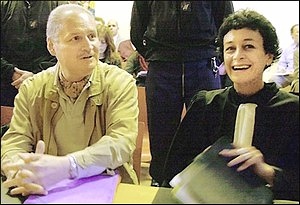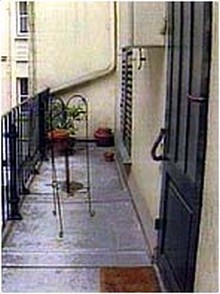 |
| Ilich Ramírez Sánchez |
 'Carlos the Jackal' 'Carlos the Jackal' on trial again in France msnbc.com, March 25, 2004 'Bin Laden of this day' accused of instigatin 1980s attacks that killed 11, injured dozens PARIS — A defiant and smiling "Carlos the Jackal," one of the most dreaded terror masterminds of the Cold War, went on trial again on Monday — this time over four deadly attacks in France nearly three decades ago. The 62-year-old Venezuelan, whose real name is Ilich Ramirez Sanchez, went before a special Paris court on terrorism-linked charges. He is already serving a life sentence handed down for a triple murder in 1975. Ramirez was one of the most feared masterminds of terror during the Cold War. He is charged with instigating four attacks in 1982 and 1983 that killed 11 people and injured more than 140 others. He has denied any role in the attacks. A panel of anonymous magistrates will rule after the six-week trial. Wearing a blue jacket, graying beard and wavy hair brushed back, Ramirez smiled as he entered and then identified himself to the court as "a professional revolutionary" — striking a combative pose from the outset. With three gendarmes at his side, Ramirez variously raised a fist in defiance, wove in anti-Zionist rhetoric into his diatribes and smiled back to someone in the tightly controlled audience in the chamber. "He's in a fighting mood as always," Isabelle Coutant-Peyre, Ramirez's lawyer and amorous partner, told reporters outside the courtroom before the trial began. She said there was "no reason" for the trial nearly 30 years after the events, and accused French prosecutors of putting him on trial for "propaganda or some other interests rather than the ones of justice." But Francis Szpiner, the lawyer for some civil parties to the case, countered that the trial was important to show that terrorists will always be pursued and to mark "the end of the culture of impunity" for them. Focus on 4 bombings The trial centers on four bombings: Two against French trains, another at a Paris office of an Arabic-language newspaper and yet another a French cultural center in then-West Berlin. Those bombings came at least seven years after what French investigators consider was Ramirez's first heyday — eight attacks over two years starting in December 1973. Ramirez is serving a life sentence for the 1975 murders of two French secret agents and an alleged informer. He was also the chief suspect in the 1975 hostage-taking of OPEC oil ministers that left three people dead. French prosecutors claim two attacks in 1982 were carried out to pressure the French government to free girlfriend Magdalena Kopp — with whom he later married and had a daughter — and comrade Bruno Breguet. Five people were killed in the March 1982 bombing of a Toulouse-Paris train — four five days after a deadline for the release of Kopp and Breguet sent in a letter to France's Embassy in the Netherlands. The letter allegedly contained two fingerprints of Ramirez. Scores were injured and a young girl was killed the next month in a bombing outside the newspaper office — the day Kopp and Breguet went on trial in another case. Both were convicted. Ramirez allegedly took hijackings, bombings and killings in mercenary style, with links for years to causes like the Popular Front for the Liberation of Palestine and in far-left European terror groups. Shadowy alliances that thrived during the Cold War kept him beyond the reach of Western secret services. But after the fall of Communism, French operatives nabbed him in 1994 in Khartoum, Sudan, and flew him to Paris. He was convicted and sentenced to life in prison three years later. Ramirez staged a nine-day hunger strike last month to protest being placed in solitary confinement after he gave a phone interview to a French radio station. His lawyers claim he was denied access to materials needed to prepare for the trial, including two DVDs containing 100,000 pages. 'A kind of star' "I am really in a combative mood," Ramirez, 62, told Europe 1 radio last month. "I'm not fearful by nature ... My character is suited to this kind of combat." The Marxist with a Che Guevara beret became the face of 1970s and 80s anti-imperialism, his taste for women and alcohol adding to his revolutionary mystique. "He was the symbol of international leftist terrorism," said Francois-Bernard Huyghe, a terrorism expert at the Institute of International and Strategic Relations, IRIS, in Paris. "One day it could be in the service of the Palestinian cause, the next day he could put bombs in French trains. He was a kind of star," he added. Ramirez's got his nickname after a reporter saw a copy of Frederick Forsyth's "The Day of the Jackal" at his flat and mistakenly assumed it to be his. His larger-than-life ego manifests itself today in waging hunger strikes and writing letters to U.S. President Barack Obama. But he and his modus operandi are anachronisms, experts say. "Carlos the Jackal was the Osama bin Laden of his day," his biographer, John Follain, told Reuters TV. "Terrorism has evolved so much that today he represents a solitary voice in the desert, a pretty old-fashioned voice." Huyghe was more blunt: "A man like Carlos is really a dinosaur today. I think of him as 'historical remains'." The Associated Press and Reuters contributed to this report. |
 Latest news Latest news |
 My love for Carlos the Jackal My love for Carlos the JackalMarch 25, 2004 Carlos the Jackal: Terrorist convert to Islam married lawyer who whines that he is jailed with "pyschopaths and murderers"
To defend a terrorist in law is one thing; to marry him is quite another. Isabelle Coutant-Peyre tells Kim Willsher how she fell for the man who was once Public Enemy Number One. Isabelle Coutant-Peyre is putting the case for the defence: to explain how she, a respected French lawyer raised in a bourgeois family and educated by nuns, fell in love with and married a Marxist-Leninist revolutionary turned international terrorist. This being France, however, the conversation turns inevitably to sex. Or rather the lack of it, since her Venezuelan husband has spent every day (and night) of their married life languishing in a high-security jail. "Everyone always asks about that aspect of our marriage," she says. "They want to know how you can marry someone and not be able to ? you know. I've come up with the perfect response. I say I've an ideal husband because he leaves me alone all night." She laughs throatily and lights another Cuban cigarillo. We are sitting in the Palais de Justice bar in Paris, where she swaps her lawyer's robe for a chic leather jacket. Gamine, with jetblack hair, kohl-rimmed eyes and a husky voice, she has an air of rebelliousness. Her mobile phone, which has already rung several times, trills again. She lowers her head and mutters into it: "I'll tell you later. Me too, me too." Snapping the phone shut, she announces: "That was Carlos." There is no need to ask "Carlos who?". Ilich Ramirez Sanchez alias "Carlos the Jackal" was once the world's most wanted terrorist before anyone had ever heard of Osama bin Laden. He has been implicated in a number of international terrorist attacks and recently, in an interview on French television, claimed responsibility for killing more than 1500 people in the cause of Palestinian liberation (he is a convert to Islam). He was imprisoned in 1997 for the murder of two French policemen and an informant 22 years earlier. Today he is Madame Coutant-Peyre's husband ? and the author of excruciating love poems penned from his cell. "I am jealous of the sun that tans you," he writes. "Of the shade that caresses you; Of your sheets that do not cover me. Of your legs not intertwined with mine." Given the national outrage that her marriage in August 2001 caused, Coutant-Peyre might have thought it wise to keep her head well below the parapet ? and the lovelorn verse for private consumption. Instead she is causing another furore with her recently published autobiography ? Epouser Carlos:Un Amour sous Haute Tension (Marrying Carlos: A High-Pressure Love) ? detailing their love affair, and including the poems. The book is intended as an explanation ? what possessed this professional, attractive woman to marry him? Yet its 279 pages, many of them filled with legal arguments (she believes Carlos was abducted from the Sudan and flown to France illegally), leave the question unanswered. "Some people view the marriage as a mistake, some a fault, a provocation, a manipulation, a folie," Coutant-Peyre admits. "A lot of my friends thought I was mad. But they know I'm not mad, so they realised it must be something else." Exactly what else? Friends do not doubt that, at 50, Coutant-Peyre is passionately in love with Carlos, who is four years older. They concede the couple may be "on the same cultural and intellectual wavelength", as one told me, but they remain baffled by the marriage. Even the writer Joseph Vebret, who worked for two years with Coutant-Peyre on her autobiography, told me he was surprised. "The marriage was symbolic," Coutant-Peyre says. "We wanted to declare that we loved each other for the rest of our lives. The fact is that we love each other like millions of others in the world. It's as simple as that." Yet it is not all that simple. The couple met in 1997 when Coutant-Peyre was working with the lawyer Jacques Verges nicknamed the Devil's Advocate whose clients have numbered Klaus Barbie and Slobodan Milosevic, and may soon include Saddam Hussein. Verges had established a team to defend Carlos, Public Enemy Number One at the time and the man behind the seizure of 70 hostages at the Opec oil ministers' meeting in Vienna in 1975 and the 1972 Munich Olympics massacre. He asked Verges to include Coutant-Peyre (who had earlier represented his first wife, the German revolutionary Magdalena Kopp) in his team. Coutant-Peyre says that it was "an honour I couldn't refuse". In her book, she describes in breathless terms her first meeting with Carlos in Le Sante prison in Paris. It was, she writes, a coup de foudre ? a bolt of lightning. "He took my hand and kissed it in the most courteous way. At that moment a wave of recognition passed between us." Shortly afterwards Carlos sacked Verges and made Coutant-Peyre head of his defence team. Although he was jailed for life on Christmas Eve the same year, she continued (and continues) to defend him in various legal and appeal actions. For more than two years, she visited him in prison, during which time they "kept their distance". It was only in 2000 that "the barriers between us exploded and the intensity of our feelings for each other was revealed". They married a year later in a Muslim ceremony in a glass-walled prison room containing a few sticks of furniture covered in graffiti. There was a solitary witness and they were watched over by guards. Carlos recited verses from the Koran, they signed a sheet of paper, exchanged rings (he gave her a platinum one from Cartier) and kissed. Then he went back to his cell and she returned to her apartment. Coutant-Peyre does not pretend it was legal, in civil terms. She had been separated from her husband, a public servant, for four years when she met Carlos, but they were not divorced. She is now, but Carlos is still married to his Palestinian second wife, Lana Jarrar ? though she has disappeared and cannot be traced. "It's recognised as a marriage by Muslims the world over," says Coutant-Peyre. "And we'll have a civil ceremony one day when Carlos is free." Aware that the ceremony would make headlines, she immediately told her three sons Florent, 25, Gabriel, 24, and Aurelien, 12, who were "just fine" about it although they didn't see why he was getting married. Her parents were horrified. They separated when she was nine, and Isabelle, their only daughter, was brought up by her, a distinguished businessman. She was educated at a Catholic boarding school, followed by the University of Science and Politics, before studying law. Coutant-Peyre admits she had always been rebellious ? "perhaps because I grew up surrounded by men, which made me tougher" ? and is famed for her confrontational approach in court. It is hard to understand what Coutant-Peyre gets out of this liaison. The French authorities have accused her of being deliberately "provocative" and threatened to have her disbarred. She simply shrugs that she would have more time for her hobbies (painting and playing the piano) if she did not work. Indeed, she seems almost to relish the prospect of a battle with the authorities. "I'm waiting for someone to show me the law stipulating that a lawyer does not have the right to marry a client, even if he's a prisoner." Coutant-Peyre believes that the authorities acted out of spite when they moved Carlos to a high-security unit 260 kilometres from the capital after their marriage. "It's full of psychopaths, murderers and sexual criminals," she says, without a trace of irony. Coutant-Peyre has always courted controversy. She has become a notorious champion of lost (or at least highly dubious) causes, claiming to take "great pleasure in defending political prisoners, freedom fighters or prisoners of conscience" ? sometimes for no fee. She admits being vehemently anti-American, describing the US as "imperialist" and "tyrannical". Today, Coutant-Peyre is in the middle of a controversy, defending a group of Breton separatists who allegedly bombed a McDonald's restaurant, killing a woman. "It's true," she shrugs, "I don't make life easy for myself. I don't have a life which is tranquil and calm and I do choose to defend some ? I wouldn't call them lost causes ? let's just say some difficult cases." She is relentless in her defence of Carlos, whom she explains, does not believe the terms "terrorist" or "terrorism" are pejorative when they describe acts committed to avoid something worse happening, or more people being killed. He believes terrorism is unofficial action that influences the politics of a state. "He is not a criminal. He is a political man, a freedom fighter, a revolutionary. And he has been very badly treated." Her opinion would cause profound offence to the 1500-plus families of her paramour's victims. Perhaps this is the defence lawyer doing her job, but it appears to be the devoted wife talking. In any case, she clearly believes every word of it. - The Sunday Telegraph |
 Carlos the Jackal Called for USA Attacks Carlos the Jackal Called for USA Attacks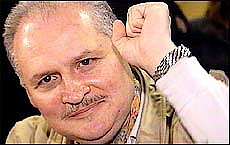 Less than two weeks ago international terrorist Carlos the Jackal called from his French prison cell for worldwide attacks on Israel and the United States. This was perhaps a warning tragically overlooked.
Less than two weeks ago international terrorist Carlos the Jackal called from his French prison cell for worldwide attacks on Israel and the United States. This was perhaps a warning tragically overlooked. Guerrilla leader, Venezuelan-born Carlos the Jackal, or Illich Ramirez Sanchez, on August 31 2001 called from his French jail cell for worldwide attacks on Israel and the United States in support of a Palestinian uprising. He addressed an open letter responding to Israel's assassination of Palestinian leader Abu Ali Mustafa, whom Carlos described as a "former comrade-in-arms". Carlos called for a "protracted people's war, without boundaries." "The killers of Abu Ali Mustafa came from Tel Aviv, the orders came from Washington," Carlos wrote. "The Yankee should beware, " he said. Mustafa, aged 64, was a founding member of the PLO and leader of the radical Popular Front for the Liberation of Palestine. He was killed in an Israeli missile attack on his office in the West Bank city of Ramallah. Israel accused him of masterminding a wave of bombings during the Palestinian uprising against Israel that broke out September 2000. After Israel's assassination of Mustafa, the United States said Israel's killings of Palestinian leaders were inflaming the conflict. Carlos wrote his letter in English, was dated the day of Mustafa's killing and addressed to George Habash, the Damascus-based former head of the PFLP whom Mustafa succeeded in July last year. Reuters reported how Carlos, who was held responsible for 80 killings in a terrorist campaign in the 1970s and 1980s supporting the PFLO, signed his letter using the Jackal's two noms de guerre - Carlos and the Arabic Salim - and with the words "Allahu Akhbar!" (God is Greater) and "Yours in Revolution". Carlos led a six-strong squad of Palestinians and foreigners that burst into an Opec meeting in Vienna in December 1975 and took about 70 people, including 11 oil ministers, hostage. Three people were killed in the raid and the Carlos gang later flew on to Algiers with 33 of the hostages, whom they released in stages there and in Tripoli before disappearing. France abducted Carlos out of Sudan in 1994 and he was jailed for life in 1997 for the 1975 murder of two French secret agents. He is now held in solitary confinement in the grim Sante prison in Paris, he makes occasional court appearances under heavy guard. |
 Carlos the Jackal focus of debate on Venezuelan policy and terrorism Carlos the Jackal focus of debate on Venezuelan policy and terrorismBy Jorge Rueda, The Associated Press,10/13/01 CARACAS, Venezuela (AP) -- Venezuela's president has swiftly condemned the U.S. terror attacks and vowed to hunt down terrorists even as he said France must respect the rights of imprisoned terrorist Carlos the Jackal. President Hugo Chavez, on a European tour this week, said Tuesday that Venezuela "has a commitment" to Ilich Ramirez Sanchez, Carlos' real name. On Friday, he said escalating the U.S.-led conflict with Afghanistan, which is sheltering terror suspect Osama bin Laden, "would be terrible and could destabilize the Muslim oil world." Opponents criticized the remarks by Chavez and other government officials, saying it showed Venezuela's official stance on terrorism is ill-defined. On the one hand, Venezuela says it "vehemently condemns terrorism and collaborates widely with countries fighting against it, and on the other hand it is difficult to hide the personal sympathy that some feel for these individuals or their organizations," ex-presidential candidate Francisco Arias said. Chavez condemned the Sept. 11 attack, but has had a rocky relationship with Washington. Vists to Iraqi President Saddam Hussein last year and befriending Cuban President Fidel Castro haven't helped improve relations. Chavez already caused a stir in April 1999 when he sent a letter to Ramirez expressing his "human solidarity," saying "every human being deserves respect." The Venezuelan-born Ramirez is serving life in prison for the 1975 murders of two French secret agents and an alleged informer. He is under investigation for three terrorist attacks in the 1980s, and he was arrested in Sudan in 1994. In an interview with the newspaper France Soir, Ramirez expressed "relief" at the Sept. 11 attacks. In 1998, Ramirez told France Soir that he wished good luck to bin Laden, who also had been indicted by a U.S. federal court in the bombings of two U.S. embassies in East Africa that killed 224 people. Ramirez has said he has killed 83 people. He testified that he led a 1975 attack that killed three people at the Organization of Petroleum Exporting Countries headquarters in Vienna. Among the 70 hostages seized in the attack was Venezuela's then-oil minister, Valentin Hernandez Acosta. The hostages were freed in Algeria. Venezuela questions whether Ramirez's rights were violated when he was abducted in Sudan by French agents and whisked away to France. "We have a commitment to this citizen, especially to guarantee that his human rights are respected," Chavez said in Paris on Tuesday. "We do this not only with Ilich Ramirez but with any Venezuelan." In Caracas, Defense Minister Jose Vicente Rangel said Wednesday that Venezuela would consider Ramirez a terrorist if "the Supreme Court or a Venezuelan court declares (him) as such." He said Ramirez would not be detained in Venezuela because "he committed no crime here in Venezuela. ... We live in a state of law." Vice Foreign Minister Arevalo Mendez Romero said Venezuela condemns terrorism but is monitoring Ramirez's case according to international protocols. He noted that Ramirez's sentence is under appeal." Arias said that Rangel's statements especially revealed the government's "lack of definition." An editorial published by the local El Nacional daily on Friday stated that Chavez' Administration "has not dared to face the terrorism issue head on because it would have to explain Venezuela's ambiguous position." But Tarek William Saab, president of Congress' Foreign Policy Committee and a Chavez supporter, compared the situation to that of U.S. citizen Lori Berenson, who was sentenced by a Peruvian court to 20 years in prison for collaborating with leftist rebels. "This is a very important precedent. The United States fought for Lori Berenson's human rights and defended her right to a fair trial," Saab said. "The Venezuelan government is obliged and has the duty to see that every Venezuelan receives a fair trial abroad, without prejudging the crime committed." |
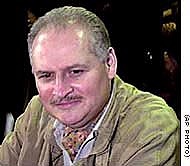  Jailed "Jackal" issues Jailed "Jackal" issuesMiddle East call to arms By Paul Holmes, Thursday, August 30, 2001 PARIS (Reuters News) — Aging guerrilla leader Carlos the Jackal called from his French jail cell on Wednesday for worldwide attacks on Israel and the United States in support of the Palestinian uprising. In an open letter responding to Israel's assassination on Monday of radical Palestinian leader Abu Ali Mustafa, a former comrade-in-arms, he said "protracted people's war, without boundaries, is the way to follow. "The killers of Abu Ali Mustafa came from Tel Aviv, the orders came from Washington," the Venezuelan-born Carlos, whose real name is Illich Ramirez Sanchez, wrote. "The Yankee should beware, we know," he said. Mustafa, 64, a founder member of the Palestine Liberation Organisation and leader of the radical Popular Front for the Liberation of Palestine (PFLP), was killed in an Israeli missile attack on his office in the West Bank city of Ramallah. Israel accused him of masterminding a wave of bombings during the Palestinian uprising against Israeli occupation of the West Bank and Gaza Strip that broke out last September after peace talks stalled. The United States said in response that Israel's killings of Palestinian leaders were inflaming the conflict. The Carlos letter, handwritten in English, was dated the day of Mustafa's killing and addressed to George Habash, the Damascus-based historic head of the PFLP whom Mustafa succeeded in July last year. It was signed off using the Jackal's two noms de guerre — Carlos and the Arabic Salim — and with the words "Allahu Akhbar!" (God is Greater) and "Yours in Revolution." Lawyers for the aging revolutionary, held responsible for some 80 killings in a campaign of attacks in the 1970s and 1980s in support of the Palestinian cause, distributed it to media on Wednesday and confirmed its authenticity. Carlos, now graying, portly and in his early 50s, led a six-strong squad of Palestinians and foreigners that burst into an OPEC meeting in Vienna in December 1975 and took about 70 people, including 11 oil ministers, hostage. Three people were killed in the raid and the Carlos gang later flew on to Algiers with 33 of the hostages, whom they released in stages there and in Tripoli before disappearing. France spirited Carlos out of Sudan in 1994 and he was jailed for life in 1997 for the 1975 murder of two French secret agents. Held in solitary confinement in the grim Sante prison in Paris, he makes occasional court appearances under heavy guard. It was not immediately clear whether the contents of the letter could expose Carlos to further charges in France. "Thirty minutes after hearing on radio?? about the assassination, I wept bitter tears of rage," Carlos wrote. "The deceitful 'peace process' has come to a pitiful demise. People's resistance in Palestine, armed operations worldwide, are the alternative to surrender," he declared. He said Mustafa had been among few Palestinian leaders he truly respected and had "led us heroically in unequal battle" in Jordan in 1970, when the late King Hussein sent in his army to crush Palestinian forces on Jordanian territory. The letter also called for an Arab boycott of Israel, Arab League sanctions on countries that trade with or support Israel and a solidarity fund for the Palestinians from Arab oil receipts for use in their conflict with the Israelis. |
 Jackal to wed for third time Jackal to wed for third time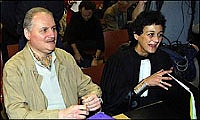 The Age, Paris, Sunday 14 October 2001
The Age, Paris, Sunday 14 October 2001The ageing, twice-married terrorist mastermind Ilich Ramirez Sanchez, better known as Carlos the Jackal, plans to marry his French lawyer, the bride-to-be said on Friday. "It's a marriage of love and of compatibility of ideas," said Isabelle Coutant-Peyre, who continued to represent the Venezuelan-born revolutionary when half a dozen other lawyers had given him up as a lost cause. "Between the image of him that is presented and the reality of what he is, there is a big difference," she said. The marriage is expected to take place at La Sante prison in Paris, where Carlos, 51, is serving a life sentence for the murder of two French secret service agents and a suspected informer in 1975.  My friend Carlos: a hitman looks back My friend Carlos: a hitman looks backBy Robert Fisk, The Independent, 18 March 2001 He was a key player in the explosive events of the 1970s, including the kidnapping of Opec ministers. Now Anis Naccache is telling his story. |
 Carlos the Jackal reveals Sept 11 secrets Carlos the Jackal reveals Sept 11 secrets September 11 2002 Cairo - Carlos the Jackal, once one of the world's most wanted men, said in remarks published from his French jail on Wednesday that anti-US groups mooted the idea of slamming planes into the World Trade Centre as early as 1991. The ageing former guerrilla leader, serving a life sentence for the murder in 1975 of two French secret service agents, said an unspecified group of "anti-imperialists" hit on the idea in revenge for the "terrible destruction" wrought by the US-led air campaign against Iraq to force it out of Kuwait in 1991. "I attended an exciting meeting of cadres from anti-imperialist groups of different ideologies. In an informal, unofficial way the need was agreed to respond with bombings in the United States," he said in a handwritten answer to questions from the London-based Arabic daily al-Hayat. His comments were published on the first anniversary of the September 11 hijacked plane attacks on New York's World Trade Centre and the Pentagon, which killed more than 3 000 people. Washington has blamed the attacks on Osama bin Laden's al-Qaeda network.
The Venezuelan-born Carlos was apparently referring to the estranged brother of former Pakistani Prime Minister Benazir Bhutto who was killed in a shootout with Pakistani police in 1996. Carlos did not say where the meeting took place. Carlos was in Sudan when he was extradited to France in 1994. "I followed the news of the attack from the beginning without stopping. I cannot describe the great feeling of satisfaction," he said. Asked what message he would send to Osama Bin Laden, Carlos said: "I would begin with brotherly greetings, then I would encourage him to continue the struggle and safeguard his life, because he has become a symbol of the jihad."
"(The US) people are really great and do not deserve the hatred of the whole world. Nevertheless, every lover of justice hates the American imperialists, the worst tyrants in the history of humanity," Carlos added. Carlos is believed to be responsible for about 80 killings in the name of the Palestinian struggle and other revolutionary causes during the 1970s and 1980s. He is best known for leading the 1975 assault on an Opec meeting in Vienna, where he and five others took about 70 people hostage, including 11 oil ministers. |
 Carlos' lawers and family claim he was Carlos' lawers and family claim he wasBy Roy S.Carson VHeadline.com, August 15, 2001 Lawyers and family of Venezuelan international terrorist Ilich Ramirez Sanchez, otherwise known as "Carlos The Jackal" are continuing to claim he was "kidnapped" by French Security agents seven years ago (August 15, 1994) in Khartoum with the direct oversight of Sudanese authorities in compliance with an order from the United States of America. In an "Open Letter to the Peoples of the World", lawyers Isabelle Coutant Peyre and Francis Vuillemin say their client remains in "as a hostage in a French prison where he is continuously subjected to provocations and humiliation by prison warders who are evidently trying to break his morale as well as his physical and mental well-being." The Foreign Ministry (MRE) in Caracas has, on repeated occasions, appealed to the French to return Ramirez Sanchez to serve the rest of his sentence in a Venezuelan jail. Ramirez Sanchez' brother Vladimir says the MRE Legal Office has urged humanitarian terms for his repatriation but the French have so far refused. |
 Carlos the Jackal goes back to court Carlos the Jackal goes back to courtPARIS, France -- International terrorist Carlos the Jackal has gone back to court -- as a witness in the trial of a German accused of taking part in an attack on an OPEC conference 25 years ago. The Venezuelan-born Carlos said he plotted the December 21, 1975, attack on the oil ministers' meeting in Vienna that left three people dead. The terrorist, whose real name is Ilich Ramirez Sanchez, told the court: "I know the operation like the back of my hand. I planned it." The 51-year-old, hinting at Libyan involvement, said the operation took shape in October 1975. But the German judge cut him short when Ramirez was talking about Middle East politics, and asked whether he knew a Hans-Joachim Klein, an alleged accomplice. Ramirez was testifying in Paris as part of the trial of Klein in Germany. French authorities refused to transfer Ramirez to Germany for security reasons. Klein, 52, is charged with three counts of murder and three of attempted murder in the OPEC attack. He denies shooting any of those killed -- an OPEC employee, an Iraqi bodyguard and an Austrian policeman. But Ramirez, who is serving a life term in France for murdering three people, told the court that Klein shot the Iraqi. In the OPEC attack, the terrorists took 70 hostages, negotiated with Austrian authorities and flew to Algeria with 35 of the hostages, where they were released. Klein, who was shot in the stomach in the OPEC raid, and Ramirez then disappeared, reportedly taking refuge in the Middle East. Klein was arrested on September 8, 1998 in a village in the Normandy region of France, where he had lived under an assumed name for five years. Ramirez says he killed 83 people. He has also been linked to the 1976 hijacking of an Air France jet to Entebbe, Uganda.He was captured in Khartoum, Sudan, on August 14 1994, and taken to Paris by French agents. |
 Ex-guerrilla Carlos to sue France over solitary confinement Ex-guerrilla Carlos to sue France over solitary confinementPARIS (Reuters) -- Convicted murderer Carlos the Jackal is taking France to the European Court of Human Rights for holding him in solitary confinement for almost six years, a lawyer for the former guerrilla leader said Thursday. Allegedly responsible for killing at least 80 people and injuring hundreds more during his terror campaigns of the 1970s and 1980s, Carlos accuses the French state of using isolation as a torture tactic. "This type of treatment, used to destroy a person both physically and psychologically, is formally outlawed by international conventions," his lawyer, Isabelle Coutant Peyre, said in a statement. "Six years of uninterrupted isolation is a record which will lead to the inevitable condemnation of the French state," she added. The French Justice Ministry said it had no immediate comment on the complaint. Carlos has been locked up in the high-security wing of Sante prison in Paris since August 1994 after the Sudanese authorities handed him over to French agents in Khartoum. The Venezuelan-born former guerrilla, whose real name is Illich Ramirez Sanchez, was found guilty in 1997 of murdering three people in 1975, including two French policemen, and sentenced to life in prison. He still faces charges for four other attacks in France in the early 1980s in which 14 people died and 200 were injured. If the Strasbourg-based European Court of Human Rights decides to hear Carlos's complaint, it could take years before it reaches a decision. |
 Venezuela to probe Carlos capture Venezuela to probe Carlos captureFriday, April 30, 1999 Carlos: Said to have received a letter from President Chavez Venezuela has announced it is to investigate the capture of the country's most notorious criminal, Illich Ramireez Sanchez, known as Carlos the Jackal, who is serving a life sentence in France. Venezuelan Foreign Minister Jose Vicente Rangel said the circumstances in which Carlos the Jackal was arrested in Sudan and taken to France for trial in 1994 would be re-examined. The family of the Venezuelan-born convicted terrorist says his capture and transfer were illegal. After meeting with his father and brother, Mr Rangel said Venezuela is obliged by law to protect the human rights of any Venezuelan citizen imprisoned outside the country. Controversial correspondence Carlos has been at the centre of speculation since it emerged recently that he had received a letter from the Venezuelan President, Hugo Chavez. Critics of the president say the letter amounted to open support of a convicted terrorist. President Chavez addressed Carlos as "Dear compatriot" and, according to press reports, signed the letter "with profound faith in the cause and the mission, now and forever". But President Chavez said he sent the letter as a mark of solidarity. Carlos hsa been linked to the 1975 seizure of Opec ministers in Vienna, Austria, and the 1976 hijacking of an Air France jet to Uganda. After three years in solitary confinement in a Paris jail, Carlos the Jackal has been sentenced to life imprisonment for killing two French secret agents and a Lebanese fellow revolutionary in 1975. |
 'Carlos the Jackal' on Hunger Strike in Prison 'Carlos the Jackal' on Hunger Strike in PrisonBy Craig R. Whitney, The New York Times November 15, 1998 PARIS -- The terrorist who calls himself Carlos has been on a hunger strike for 11 days, protesting his four years of solitary confinement in a French prison, where he is serving a life sentence for murder. Carlos, 49, whose real name is Ilich Ramirez Sanchez, has been drinking water, and his life is not threatened, said officials at the Sante Prison. They said they had no intention of changing their treatment of him. In handwritten letters in French and English made available by his lawyers, Carlos says he is preparing for his death and has called on his supporters to kill one American or Israeli for every one of the 1,551 days he has been held in France. French agents acting on a tip from the CIA seized Carlos from a hospital room in Sudan in August 1994. He was brought here and tried for murder in shootings, bombings and other acts of terrorism that the authorities accused him of committing on French soil in the 1970s and against French institutions elsewhere in the 1980s. "I love France, eternal France, and I would regard as personal betrayal any attack in my name on a French citizen," Carlos said in a declaration in French titled "In case of my death," distributed by one of his lawyers, Isabelle Coutant-Peyre. "By contrast, I ask as the last wish of a living martyr that a United States or Zionist enemy be executed for each day that I have spent in prison in France, and that's the duty of my comrades, of all mujahedeen and of all the revolutionaries of the world," he wrote, using the Arabic word for holy warriors and signing off with "God is great," in the name of the Palestinian cause. The son of a Venezuelan Marxist lawyer, Carlos was named Ilich in honor of Vladimir Ilyich Lenin and was sent to Moscow to deepen his knowledge of Marxism. After being expelled as a troublemaker from Lumumba University in Moscow in 1970, he found his way to Beirut, Lebanon, and adopted his nom de guerre at the suggestion of a leader of the Popular Front for the Liberation of Palestine. Advocating violent struggle, the group gave Carlos the first vehicle for his anti-American revolutionary ambitions. After leading a series of spectacular actions that included the kidnapping of the oil ministers of the Organization of Petroleum Exporting Countries in Vienna in 1975, he allied himself with the West German terrorist group Baader-Meinhof. For a few years during the Cold War, he was allowed to operate from East Berlin, Budapest and other Communist capitals in Eastern Europe. In a new book about him ("Jackal," published in London by Weidenfeld & Nicolson), John Follain, a British journalist, says Carlos sought refuge in Syria when the Communists tired of him. The Syrians, learning that the French were on his trail, tried to expel him to Libya in 1991, but the authorities there did not want him, either. Eventually he wound up in Sudan, where he was recovering from an operation when French agents, with the tacit approval of the Sudanese authorities, pounced on him, wrapped him up in a burlap bag and flew him to Paris in an executive jet. He was convicted in Paris last Dec. 24 of the murder of two French police agents and a Lebanese informer in the Latin Quarter in 1975. On Nov. 3 he began his hunger strike, he said in an open letter to Justice Minister Elisabeth Guigou, after being accused of insulting a prison guard. The prison authorities disciplined Carlos with five days of stricter solitary confinement, saying he had cursed at and insulted the guard, who had interrupted a meeting with his lawyers. "I do not know the professions of the mother of this individual, or his sexual inclinations, and I did not yell at him questioning his virility or his mother's morality," Carlos wrote. "On the other hand, I did criticize his lack of civil courage and disregard for his own origins shown by conducting himself like an agent of colonialism." The guard is of West Indian descent. He then vowed to refuse to take food or water to protest interference with his mailing privileges and to demand the right to receive visitors other than lawyers and take French lessons, Mrs. Coutant-Peyre said. The prison authorities said Carlos had partly broken his fast on Tuesday night by drinking nearly a gallon of mineral water. |
 Jackal keeps his best weapon - his mouth - until last Jackal keeps his best weapon - his mouth - until lastBy Susannah Herbert in Paris, Telegraph 18 December 1997 The Venezuelan self-proclaimed "professional revolutionary", who is facing a triple murder charge, has admitted to waging war "against Zionists and American imperialists" using "the pen, the gun, the bomb and the noose". His best remaining weapon, he announced on Tuesday, was his mouth. He said: "My duty is to continue the struggle with my tongue." Warning the judge, Yves Corneloup, that his network of operatives was still at work in France, Carlos did not shrink from blatant threats when the questioning focused too closely on his career with the Popular Front for the Liberation of Palestine (PFLP). "You are taking on a personal responsibility, your honour," he said, after being told that the courtroom was not a theatre. "I'm not under orders from you. Don't forget who I am. I'm not going to give you yes or no answers. I'm a revolutionary militant." When asked if his group had committed executions, he said: "Yes, even the execution of French judges." The assassination of a certain Judge Michel in Paris in October 1981, he said, "was done by us". So far, the questioning has concentrated on the biography of the defendant, born Ilich Ramirez Sanchez in Caracas 48 years ago. Denying a prosecution suggestion that he was psychologically affected by his playground nickname of El Gordo ("Fatso"), Carlos claimed that such names were a feature of all happy Venezuelan childhoods. He said: "My father was called El Viejo, 'the old one'; my brother, Lenin, was El Negro or 'black one' because he was rather swarthy," and told the courtroom that both his uncle and his father had staged "at least 10 coups d'état in Colombia". He ridiculed the prosecution claim that he was recruited by the KGB and sent at their expense to Patrice Lumumba University in Moscow, but confirmed that, as a student, he excelled in chemistry. "I am an explosives expert, your honour," he said. "I'm even an instructor." Confirming that he left Moscow to fight for the liberation of Palestine, he reminisced about "the gorgeous Scandinavian girls" who went to Amman "on revolutionary tourism trips". M Corneloup's questions about the PFLP's activities in Europe, where Carlos was sent in 1971, inspired the defendant to fresh hilarity and insolence. The judge wanted to know why he was sent to Europe. Carlos said: "Why do you think? To buy tulips in Holland? We went to war, but in suits and ties. We started with hijackings and that will start again, it's inevitable: war against the Zionists, the American imperialists in the whole world." Further inquiries on the details of PFLP activity, however, saw his mood change. He said: "What will you pay me? You want to treat me like a little sneak? That's very serious. I've had a full, rich, productive life. I've been a good example for the revolution, it will go on without me. I will rejoin my companions in paradise. I was at war for 30 years. I've done nothing I regret. Carlos has seized the world's imagination." The trial was due to finish tomorrow, but defence delaying tactics mean that it is now expected to continue into next week. The newspaper Evenimentul Zilei reported that Ceausescu sold arms and explosives to Carlos and enabled him to produce counterfeit passports and driving licences. Carlos was paid for his missions through the Romanian bank account of his wife, Magdalena Kopp. |
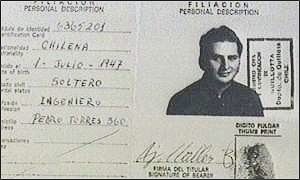  Carlos the Jackal to Appeal Carlos the Jackal to Appeal Against Life Sentence Dec. 24, 1997  The BBC's Stephen Jessel The BBC's Stephen Jessel reports from Paris Venezuelan terrorist, Ilich Ramirez Sanchez, known as Carlos the Jackal, is to appeal against his life sentence for killing two French secret agents and a Lebanese fellow revolutionary in 1975, his lawyer has said. Ramirez, 48, who has been blamed for more than 80 deaths and hundreds of injuries during his pro-Palestinian struggle in the 1970s and 1980s, was found guilty of murder with aggravating circumstances. The verdict came after an eight-day trial in which Ramirez was unable to refute evidence tying him to a shooting in Paris in 1975. The nine-member jury deliberated for nearly four hours before finding him guilty of shooting investigators Raymond Dous, Jean Donatini and Michel Moukharbal, a Lebanese colleague of Ramirez. Ramirez said he was not afraid of spending the rest of his life behind bars: "They want to sentence me to life in prison. I'm 48 years old, so it could be another 40 or 50 years. That doesn't horrify me." After hearing the verdict, Ramirez smiled, shook his fist in the air four times at the audience and walked out of the courtroom, escorted by police guards. "Viva la revoluçion," he said.  Press Release by Carlos' lawyers team Press Release by Carlos' lawyers team Carlos about Condition in Fresnes Prison Carlos about Condition in Fresnes Prison Carlos' Message to his Wife Carlos' Message to his Wife Carlos sentenced to life in prison Carlos sentenced to life in prisonA French jury convicted Carlos "The Jackal" of murder Tuesday after the defendant gave a rambling, three-hour harangue in which he said "there is no law for me." A judge sentenced him to life in prison. (CNN, Dec. 23, 1997)  Father fights to clear the name of "Carlos the Jackal" Father fights to clear the name of "Carlos the Jackal"San Cristobal, Venezuela (AP) The aging Marxist lawyer proudly holds a photograph of his oldest son, then softly kisses the image sent from a Paris prison. (CNN, Dec. 18, 1997)  Carlos the Jackal Defends Himself Carlos the Jackal Defends Himself BBC Paris Correspondent, Stephen Jessel, BBC Paris Correspondent, Stephen Jessel, has been following the trial (Dur: 1'18") Carlos is alleged to have masterminded a series of bombings, kidnappings and hijackings in the 1970s in support of the Palestinian cause. He is being tried for killing two French intelligence agents and a fellow militant in 1975. Earlier, the trial had been suspended when his lawyers said they were pulling out because the court refused to rule immediately on their request for a fresh investigation. The court also turned down an appeal by Carlos, whose real name is Ilich Ramirez Sanchez, to set him free on the grounds that he was arrested illegally by French agents in Sudan in 1994. (BBC) Dec.16, 997  Carlos lawyers withdraw, Carlos lawyers withdraw,halting Paris murder trial PARIS, Dec 15 (Reuters) - The Paris murder trial of Carlos the jackal ground to a halt on Monday after his legal team withdrew, forcing judge Yves Corneloup to appoint a new defence lawyer for the aging guerrilla mastermind. (CNN, Dec. 15, 1997)  Carlos gets his day in court Carlos gets his day in court"My name is Illich. My family name is Ramirez Sanchez. I was born on October 12, 1949, in Caracas." So said the man known as Carlos the Jackal, who quickly dispelled any doubts Friday about his revolutionary zeal at the start of his trial on charges of murdering two French secret agents and their informer in 1975. "My profession is professional revolutionary," he declared in a four-hour opening session. He demanded that the murder charges against him be dismissed. "The world is my domain." Portly and graying in a cream polo shirt and ascot, he looked more like a debonair banker on holiday than an international terrorist. "I deny the right of French justice as it is currently constituted to judge me," he said in a speech denouncing the "monstrous arbitrariness" of the trial. "I can't be judged because of the conditions of my arrest," Ramirez said, referring to his capture in Sudan in August 1994. He was reportedly given an injection before French agents spirited him, in a sack, to France. It was the first time the public had a close-up look at the man who existed for decades only in grainy photographs. He eluded authorities for decades, carrying out attacks that by his own count left 83 dead.(CNN, December 12, 1997) |
"Good media about Ilich: Andrew and Brain are two people that we would like to thank for their webwork about Ilich, the cscpla would like to further coop with them our wwworker will take care of that, there you would find files (some from cscpla) good info, good people." CSCPLA | Thanks, I do appreciate it. Unfortunately, I had no chance to contact Carlos or his lawyers so far, so, please, do not hesitate to let me know more detailed comments about texts, links and sources I used, though I know that the true story about the detainee 872686/X Carlos shall remain untold forever. |
 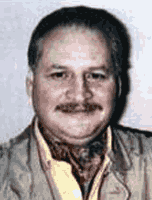 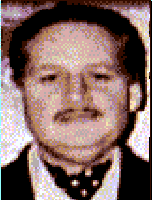 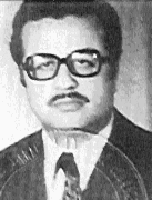 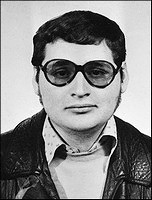 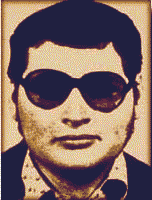 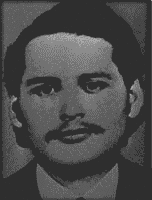 |  Terrorist Carlos the Jackal to stand trial Terrorist Carlos the Jackal to stand trial for 1975 murders 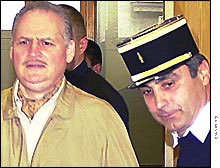 (CNN News, Dec. 12, 1997) (CNN News, Dec. 12, 1997)PARIS (CNN) -- After an international manhunt spanning more than 20 years, Carlos the Jackal, one of the world's most wanted and feared terrorists, goes on trial for the slayings of two French investigators and a Lebanese national. Once, the Venezuelan-born guerrilla was the most feared name in terrorism. In the 1970s and early 1980s, his legend only grew as he struck again and again. He was linked with attacks and mayhem that killed more than 80 people. Today, Carlos the Jackal, whose real name is Ilich Ramirez Sanchez, sits in a French prison. Prosecutors hope to put the terrorist behind bars for 30 years. Ramirez' fingerprints on the weapon and his description of the killings in an interview are giving the prosecutors a virtually open-and-shut case. Despite being the world's most wanted terrorist, his ability to slip across borders with the help of some East Bloc and Arab countries just added to his myth. By his own count, the terrorist killed 83 people. Carlos was bred for terrorism, experts say The son of a left-wing Venezuelan lawyer who named his three sons Vladimir, Illich and Lenin after the late Soviet leader, Carlos had a textbook guerrilla career starting with studies at Moscow's Patrice Lumumba university for Third World students. Experts say he joined the violent Popular Front for the Liberation of Palestine (PFLP), cutting his teeth with the attempted murder of prominent British Zionist and Marks and Spencer department store chief Edward Sieff in his bath in London. Carlos is most infamous for his participation in the 1972 massacre of 11 Israeli athletes by Palestinian commandos at the Munich Olympics. He plotted the 1975 seizure of all 11 oil ministers at a Vienna OPEC meeting, and the 1976 Palestinian hijacking of a French jetliner to Uganda. Support for the terrorist dried up as Communism collapsed and Middle East governments began looking for peace. Carlos was said to have been invited to leave his Damascus refuge in 1991 and to have been turned away from Libya and Baghdad. He found a last retreat in Sudan in 1993, whiling away time with his Jordanian wife Lana Abdel Salam Jarrar. In a snapshot taken during his last months as a free man in Khartoum, he looked heavier and more like a respectable businessman than an architect of terror. He may have run out of sponsors for terrorism by the time of his capture, but former French intelligence director Pierre Marion said that had no apparent affect on his love for excess. Once flamboyant, now behind bars Now, the flamboyant guerrilla who blazed a trail of terror across half the world, is a lonely middle-aged prisoner who misses his Havana cigars and may spend the rest of his life in a French jail. He has been languishing in solitary confinement since French secret agents spirited him from Sudan more than three years ago. He will be brought to justice with the help of the Sudanese, who arranged for his arrest after he was anesthetized for minor surgery in 1994. They handed him over to French agents, who bundled him into a sack and onto a plane bound for Villacoublay airbase outside Paris.
Many in his old Paris neighborhood knew the story that even Ramirez himself bragged about -- the cold-blooded murder of two unarmed French police officers and an informant. In June of 1975, Ramirez was posing as a student in a small Paris apartment when two unarmed investigators and a fellow militant arrived at his door to question him. Ramirez subsequently opened fire, killing all three, and fled the country. Twenty-two years after the terrorist escaped over the rooftops to begin his life on the run, a lawyer for the victims' families expresses his certainty that Carlos will never escape again. "For all the terrorists all over the world, this trial means that ten years after, 20 years after, 30 years after, you can be judged one day and be punished," Francis Szpiner, the lawyer for the victims' families. Carlos, in fact, has already been tried and found guilty in absentia of the Paris police murders. Although Paris law requires new court proceedings now that he is actually in custody, few expect this trial to last more than a week. In the three years he has been shuttling between French courts and jails, investigators have gathered implicating Carlos in at least five other terrorist attacks in France. The crimes should keep him in front of judges for years. It is said that from his isolation cell, the flamboyant terrorist has sometimes been heard screaming at night: "It's me, Carlos!" Only his fellow prisoners and jailers can hear him now. Correspondent Jim Bittermann and Reuters contributed to this report.  RIOT-L Archives: Lawyer doubts RIOT-L Archives: Lawyer doubts Carlos will get fair trial in France ( RIOT-L Archives, Oct. 1997)  Carlos "The Jackal" Captured, Jailed in Paris Carlos "The Jackal" Captured, Jailed in Paris(Emergency.Com)  Hafez Assad made Clinton an offer Hafez Assad made Clinton an offer Tracking the Jackal Tracking the Jackal Castro trained terrorist Castro trained terrorist Jailed terrorist lashes out at France Jailed terrorist lashes out at FrancePARIS (Aug 31, 1995 - 19:54 EDT) -- Carlos the Jackal, held in solitary confinement since his arrest a year ago as the world's most-wanted terrorist, is tired of being alone. On the eve of a court appearance in which he planned to plead again for his freedom, Carlos lashed out again at the French government for keeping him in an isolation cell in a Paris prison since the day after he was arrested, saying he was being "deprived of the most elementary rights accorded to all detainees." In a statement released Thursday by his lawyers, the global gun-for-hire also complained about what he called the mysterious disappearance of his 26-year-old Jordanian mistress. "For more than a year, no one has had any news of her," he said. Carlos said the woman, Lana Jarrar, vanished after his arrest in Sudan on Aug. 14, 1994, ending two decades of hijackings, bombings and assassinations that by his own count killed 83 people. The 45-year-old Venezuelan-born terrorist, whose real name is Ilich Ramirez Sanchez, has been linked to the massacre of 11 Israeli athletes at the 1972 Munich Olympics; a 1975 attack on OPEC headquarters; and the 1976 hijacking of an Air France jet to Uganda. Carlos was extradited in chains to France, where he had been convicted and sentenced in absentia in 1992 to life in prison for the killing of two French counterintelligence agents in 1975. By law, France must retry him now that he is in custody. The French government also plans to try Carlos for various bombings in France in the early 1980s that killed 11 people and injured dozens more. A judge this month renewed Carlos' committal order, meaning the French government can hold him for a second year without actually starting any of the four trials pending against him, judicial sources said. In his statement, Carlos also accused French authorities of denying him a visit from staff of the Venezuelan Embassy despite numerous requests. His lawyers said they haven't yet received copies of the government files against Carlos and that the French government hasn't allowed Carlos to study French grammar and writing, "which are essential for the understanding of his defense." The Justice Ministry declined to comment.  RIOT-L Archives: Police arrest RIOT-L Archives: Police arrest ex-Syrian diplomat linked to Carlos ( RIOT-L Archives, Oct. 1994) |
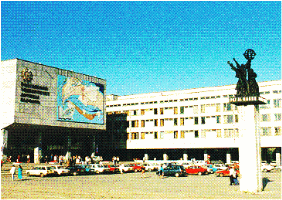  Peoples' Friendship Peoples' FriendshipUniversity of Russia former Patrice Lumumba University 1968 Carlos begins study at Patrice Lumumba University in Moscow, famous as "training ground for future terrorists and KGB recruits". The PFUR has eleven faculties, Research Institutes, some Separate Institutions and Other Units.  Faculties Faculties Diplomas and Degrees Diplomas and Degrees
 Russia's terror university Russia's terror university(CNN - video, July 26, 1997)  From Marxism 101 to Capitalism 101 From Marxism 101 to Capitalism 101Russian university changes its name, curriculum (CNN, July 26, 1997)
 The 1981 Bombing of Radio Free Europe The 1981 Bombing of Radio Free EuropeBy Richard Cummings A very interesting story based on some top secret documents of the former East German intelligence service known as STASI  Menace Of Terrorism Menace Of Terrorism( The Hindu Online, Jul. 03, 1996)  Co-Conspirators? Co-Conspirators?
Terrorism - Personalities |
Carlos's head on a plate in return for the Golan Heights. THE SACRIFICIAL OFFERING By URI DAN & DENNIS EISENBERG authors of Carlos: Terror International. (C) The Jerusalem Post 1992 Thursday, August 25, 1994 When Ilich Ramirez Sanchez, better known as Carlos, was nabbed in Khartoum last week, he was found with a young Palestinian girl recruit from a Lebanese training camp. He had brought his new mistress with him from Syria, first sending his wife and daughter off to Venezuela "on holiday". But there was something of greater importance to the French anti-terrorist squad sent to grab the arch-terrorist than evidence of his notorious philandering. It was the discovery that Ali Fallahian, Iranian "Special Action" minister, had personally sent Carlos on a mission to Khartoum. Fallahian travels the world masterminding the international terror campaign conducted from Teheran. Recent results of his efforts include the destruction of the Jewish community's center in Buenos Aires and bomb attacks in London. A French source told us: "We were given the information about Carlos's whereabouts by the CIA in January, after President Clinton and Syria's Hafez Assad met in Geneva. Assad had offered Clinton Carlos's head as a gesture to persuade the US to remove Syria from the list of countries supporting terrorism. His second demand was US pressure on Israel to return the entire Golan Heights to Syria within 90 days". Once Carlos realized that his "friends" Assad and Fallahian had sold him out, he wanted vengeance. He told his captors that his job in Sudan was to monitor training by a hitherto-unknown terrorist unit called Allahu Akhbar (God is great) based in an old fort outside Khartoum. Carlos has refused to go into detail until his jailers are ready to make a deal. But Western intelligence agencies, aided by satellite spy cameras, have focused on this elite terrorist unit. We were told by an intelligence expert in Paris: "It's no secret that the Sudan, funded by Iran, is today's major center for training Hamas, Hizbullah, Islamic Jihad and Egyptian and Algerian fundamentalist recruits. The most intelligent, versatile and fanatical candidates are creamed off to join Allahu Akhbar. We suspect that they assassinated Egypt's president Sadat and Bashir Jemayel, the Lebanese Christian leader. They led the group which came close to killing George Bush on a visit to Kuwait after the Gulf war. "Heading their hit list are Yasser Arafat and King Hussein, both condemned to death for their 'treachery' in dealing with Israel. Targeted too are Jewish and Western personalities considered infidel traitors to Islam (Iranian style). One such man is French Interior Minister Charles Pasqua, currently cracking down on extremists among France's three million-strong Moslem population. The imams of Iran repeatedly condemn him in their Friday sermons, in speeches and in the press". The plot to offer Carlos up as a sacrificial lamb to the US was hatched by Fallahian and Assad. And Carlos, lulled into a sense of security Algeria. The deal was hastily finalized - including a cash reward of $1 million to smooth the way with Sudanese police and army officers. The French said they would do their best to persuade the US to remove Syria, Iran and Sudan from the list of official supporters of terrorism. To date, Clinton has resisted this demand firmly. |
C A R L O S  Illich Ramírez Sánchez (b. 1950), one of the most famous graduates of the Cuban camps, often called "El Chacal", "Carlos the Jackal", "the Jackal", was responsible for much of the success of Palestinian terrorism in Europe. His actions, in Mousset's words, "provides categoric proof of the unity of action of the terrorist groups operating in Europe and elsewhere as well as the close links between the terrorist networks and certain foreign intelligence services." Illich Ramírez Sánchez (b. 1950), one of the most famous graduates of the Cuban camps, often called "El Chacal", "Carlos the Jackal", "the Jackal", was responsible for much of the success of Palestinian terrorism in Europe. His actions, in Mousset's words, "provides categoric proof of the unity of action of the terrorist groups operating in Europe and elsewhere as well as the close links between the terrorist networks and certain foreign intelligence services."Carlos is the son of a left-wing Venezuelan millionaire, Jose Altagracia Ramirez Navas. He named his three sons Ilich, Lenin and Vladimir, after the Russian Bolshevik leaderVladimir Illich Lenin, and raised them to be revolutionaries. After moving to London with his mother, Carlos ended up in Moscow, where he attended Patrice Lumumba University, from which "was expelled in 1971 for frivolity". As Patrice Lumumba University was a notorious training ground for KGB spies and terrorists, others maintain that he was really recruited as a KGB agent and that the expulsion was faked in order to maintain his cover. At the Patrice Lumumba University in Moscow where Carlos met Mohammed Boudia, the top man for the Popular Front for the Liberation of Palestine (PFLP) in Europe. The PFLP is one of the terrorist organizations within the PLO, and the organization with which Carlos was to be most closely associated. Using the nom de guerre "Carlos," Sánchez went to Paris where he took command of a Popular Front for the Liberation of Palestine cell in the early 1970s. Sánchez is believed to have made an assassination attempt on 31 December 1973 against Marks and Spenser magnate Teddy Zieff who was wounded but not killed due to a malfunction of the gun. Sánchez was implicated in terrorist bombings of three pro-Israeli newspapers and authorities say he fired shoulder-launched missiles at at a Paris Orly airport in 1975, in attempt to destroy an Israeli El Al airline jet. As a young man, Illich Ramírez Sánchez was involved with Venezuelan guerrilla groups, and he attended the Tri-Continental Conference in Havana in 1966. He later returned to Cuba where he trained in one of the camps studying urban guerrilla tactics, automatic arms, plastic explosives, sabotage, map-making and reading, photography, forgery and disguise. Carlos went to Jordan in 1970 and fought with PLO guerrillas against the Jordanian Army in what became known as the "Black September" operation. It was so called because King Hussein, angered by the use of Jordan as a base for Palestinian terrorism, ordered an all-out military assault against the PLO and expelled tham after heavy fighting during which hundreds of Palestinians died and thousands more fled, some to Israel. Carlos later referred to this battle as a "useful guerrilla experience." Black September inspired the formation of a new terrorist group known by that name which was responsible for, among other atrocities, the Munich Massacres. Carlos was behind the hostage taking at the 1972 Munich Olympics that ended in the massacre of 11 Israeli Olympic athletes, After the events of Black Septe produced to link him to an atrocity, it was often blamed on him, out of convenience or ineptitude. But, regardless of embellishments, the reality of "Carlos" was described by a Saudi Arabian Oil Minister, who had been kidnapped during the 1975 OPEC takeover. "Carlos...is a ruthless terrorist who operates with cold-blooded, surgical precision," according to Ahmed Zaki Yamani. Lauded by some as a "professional killer" with 'cool, deliberate actions", he also has been described by others as a "bumbling psychotic who shoots people in the face, and is extremely lucky." Whether luck, or ruthless brutality, "Carlos" has reveled in the limelight of his deadly performance. Although the attackers called themselves "the Arab Revolution", the group consisted largely of German members of the Red Army Faction (q.v.) and the Venezuelan Carlos. The terrorists demanded $5 million in ransom and may have received as much as $50 million from Iran and Saudi Arabia. After 36 hours of negotiations, the Austrian government allowed the terrorists and 42 of their hostages to leave Austria on a DC-9 that landed first in Algeria, where a wounded West German terrorist was taken off the plane, then to Libya where their ransom money was off-loaded and transferred to a South Yemenese bank, and then back to Algeria where the terrorists surrendered and the hostages were released. Apparently the motive of the terrorists was primarily extortion. Libya allowed them to unload their ransoms in Libya and later permitting them sanctuary there. Qaddafi's involvement with sponsorship of terrorist groups began in the same period with aid to Black September (q.v.) in its attack on the Saudi Arabian Embassy in Khartoum on 1 March 1973 and in its attack on Athens airport on 5 August 1973. Muammar Qaddafi (b. 1941), leader of the coup d'état that overthrew King Idris of Libya on 1 September 1969, Colonel Muammar Qaddafi has been the president of the Libyan Arab Republic, also called by Qaddafi the Libyan People's Arab Socialist Jamahariyyah. Qaddafi is of Bedouin extraction and is a devout Muslim. As a youth he greatly admired Egyptian leader Gamal Abdel Nasser and so Qaddafi's pronounced anti-Western sentiments appear to spring from his ardent Pan-Arabism and hatred of Israel. Accordingly he ordered the U.S. military forces out of Libya in 1970, ancelled the British-Libyan military accord in 1972, nationalized U.S. oil companies holdings in Libya, and played an instrumental role within OPEC in raising producer oil prices. In 1975, Qaddafi broke off relations with the PLO and began to back the renegade Fatah Revolutionary Council led by Abu Nidal (q.v.). Consequently Qaddafi is suspected of complicity in the December 1985 hijacking of an Egyptair airline to Luqua airport in Malta and the massacre of holiday travelers at Rome and Vienna airports on 27 December 1985. Qaddafi clashed with the United States over the question of Libyan claims to sovereignty over the Gulf of Sidra. U.S. naval exercises in those waters led to clashes between Libyan and U.S. forces in March 1986. The United States held Libya responsible for the 5 April 1986 bombing of the La Belle discotheque in West Berlin, a favorite nightclub of U.S. servicemen. In retaliation, the U.S. Air Force conducted bombing raids on Benghazi and Tripoli, striking one of Qaddafi's residences and apparently killing one of his foster children. Qaddafi became uncharacteristically reticent after this incident. This did not portend any renunciation of terrorism, however. On 14 April 1988, the "Jihad Brigades," a unit of the Japanese Red Army acting under Libyan sponsorship, carried out a retaliatory bombing against a USO club in Naples, killing five patrons. On 14 November 1991, the United States Carlos' activities in England and a Cuban diplomat was recalled. (The Economist, "Foreign Report," published by The Economist, (London) #1526, March 8, 1978 & March 15, 1978. ) Carlos was the best-known of the terrorists trained in Cuba, but there were many others. Much the same training has been given to hundreds of Palestinians sent to Cuba during the 1970's, a fact acknowledged by one of Arafat's closest aides, Abu Iyad, in 1978. (Reuters, May 30, 1978). As Claire Sterling says, "The Palestinians, soon to become a second great magnetic pole for apprentice terrorists, began sending their own apprentices to Cuba in 1966: Cuban instructors have taught in Middle East feyadden camps since the early seventies." (Claire Sterling, op. cit, page 15. ) "By 1976," The Chicago Tribune reported, "the CIA estimated there were 300 Palestinians in Cuban camps." (John Maclean, "Cuba sparks Latin terror," The Chicago Tribune, June 18, 1981.) Among the documents captured by the Israeli armed forces in southern Lebanon in 1982 was a letter written by one of the Palestinians being trained in Cuba to a friend back in Lebanon. The letter, which is printed in the appendix, says, "As for the General Union of Palestinian Students, the Fatah is trying to thwart its activities. The El-Heriya (a periodical) reaches us regularly. Why are shelters not being built in Damur? How are the relations with the El Amal Organizations after the recent exchange of fire with them? How is the arming process prgressing?" (Raphael Israeli, op. cit., page 144.) It is simply the thoughts of one friend to another, but it does provide an insight into the factional and military lives of members of the PLO - whether in Lebanon or Cuba. On 27 June 1976 Air France flight 139 from Tel Aviv to Paris, carrying 245 passengers and 12 crew members, was hijacked out of Athens by seven members of the Popular Front for the Liberation of Palestine (q.v.) to Benghazi, Libya, where the plane was refueled. From there it flew to Entebbe Airport, Uganda, where the hijackers were aided by Ugandan troops in guarding the hostages. The hijackers demanded the release of 53 terrorists held in French, Israeli, Kenyan, Swiss, and West German jails, including Kozo Okamoto, sole surviving terrorist involved in the May 1972 Lod airport attack. Three of the terrorists were non-Arabs believed to be associates of Ilyich Ramírez Sánchez, known as "Carlos." Throughout the hostage seizure the Ugandan dictator, Idi Amin, fully supported the terrorists. By 1 July 1976, the terrorists had released nearly all non-Jewish and non-Israeli hostages, leaving 103 at Entebbe. On 2 July the Israeli cabinet decided upon Operation Thunderbolt, a plan to send Israeli commandos to Entebbe to rescue the hostages. On 4 July 1976, the Israelis rescued all but four of the hostages, three having been killed by the cross fire at the rescue scene, while another passenger, Dora Bloch, age seventy-five, was absent having been hospitalized in Kampala. The rescuers killed 7 of the terrorists and about 20 Ugandan soldiers, while the Israeli officer leading the rescue, Jonathan Netanyahu, was the only Israeli soldier killed in the attack. The Israelis destroyed 11 Ugandan air force MIGs to prevent any attempt to interfere with the rescue mission on its return to Israel. Following the rescue Dora Bloch was reportedly murdered and her body burned, while Idi Amin carried out a widespread purge and executions of Ugandan officials charged with guarding Entebbe airport and the hostages. In 1983 a group calling itself the Organization for the Armed Arab Struggle (The OAAS) surfaced reportedly under Sánchez's leadership and accordingly known also as the "Carlos Apparat." While the group generally carries out actio from 11 to 20 years of their sentences. Although German officials say the RAF has largely disintegrated, they worry about successor organizations that have assumed the RAF's ideological mantle. The emerging Anti-Imperialist Cells (AIZ), for example, mounted several bombing attacks against German interests in 1995. Among far-right groups, German authorities noted an increasing tendency to link up with neo-Nazi groups abroad, especially through the use of electronic communication networks. In the culmination of what journalists said was a two-year investigation, Milan police arrested 11 persons on 26 June at Milan's Islamic Center and made additional arrests a few days later. Police officials told the press that the group provided support for an international network of Islamic terrorist organizations, including the Egyptian al-Gama'at al-Islamiyya (Islamic Group or IG). A police spokesman also said the arrestees maintained contact with the "Blind Shaykh," Umar Abd al-Rahman, who was convicted in October for conspiring to commit terrorism in the United States. Charges against the accused include conspiracy, extortion, armed robbery, falsifying documents, and arms smuggling. 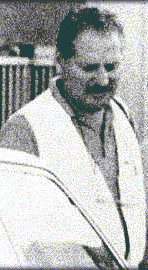 A disguises and known to have obtained any number of false identities, complete with passports and credit cards, Carlos was arrested on 15. August 1994 few hours after a harmless operation at the abdomen in a hospital in Karthum where he was hospitalized under the name Ali Barakat. He just fell asleep when several men broke in his room, pull him brutally from the bed, pull to him a mask over the heading and push him into a kleinlaster. In racing travel it goes then from the elegant suburb Taif of the Sudanese capital Karthum to the airport. There a French private jet waits on a Nebenpiste with engines on. Illich Ramírez Sánchez, alias "El Chacal", alias "Carlos the Jackal", alias "the Jackal", alias Ali Bakarat was brought in the plane in a jute bag. A disguises and known to have obtained any number of false identities, complete with passports and credit cards, Carlos was arrested on 15. August 1994 few hours after a harmless operation at the abdomen in a hospital in Karthum where he was hospitalized under the name Ali Barakat. He just fell asleep when several men broke in his room, pull him brutally from the bed, pull to him a mask over the heading and push him into a kleinlaster. In racing travel it goes then from the elegant suburb Taif of the Sudanese capital Karthum to the airport. There a French private jet waits on a Nebenpiste with engines on. Illich Ramírez Sánchez, alias "El Chacal", alias "Carlos the Jackal", alias "the Jackal", alias Ali Bakarat was brought in the plane in a jute bag.A few hours later, French Minister of the Interior Charles Pasqua announced that a professional hitman and international terrorist Illich Ramírez Sánchez that is hunted for 19 years by the French secret service, was finaly arrested. "The list of the acts of terrorism, which he committed or however prepared, is impressing. " Since that 15 August 1994 the Top terrorist sits in a cell - for safety reasons sometimes in the middle in Paris Santé prisons, sometimes in addition, in the suburb prison Fresnes - and enjoys since the status of a luxury prisoner. He smokes heavy Havannas, had even his own cigar cutter (which is strictly forbidden normally in a prison) and over his lawyers 30 daily and weekly papers subscribed. If he finds something, which does not please him in an article, the journalist receives protest letters from the prison cell. On the basis of a French warrant, Italian police arrested former Red Army Faction member Margo Froehlich in October 1995. A German national, she was wanted for complicity in a Paris attack in 1982 carried out by international terrorist Illych Ramirez Sanchez (Carlos) that killed one person and injured 63. Acording to Clark Staten, a veteran emergency services manager, the author of "The Emergency Response Guide to Terrorism" and the Executive Director of the Emergency Response & Research Institute, an emergency service 'think tank', based in Chicago, IL, the end of the "Cold War" and the collapse of the U.S.S.R., may have placed Carlos in a situation with few sponsors, and little ideological motivation to continue his terror campaign. |
